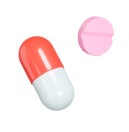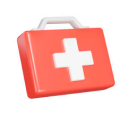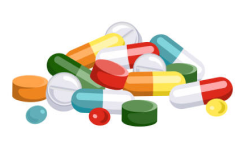Uses
What is Prochlorperazine for?
Prochlorperazine is a type of anti-emetic agent which blocks dopamine (a type of chemical messenger). By blocking dopamine, signals are unable to travel to the vomiting center in the brain, therefore relieving the sensation of nausea (feeling sick) and vomiting on its own or nausea and vomiting due to other causes such as Meniere disease or inner ear problems for example vertigo (giddiness).
How should I take or use Prochlorperazine?
-
It is available as tablet and injection formulation
-
Follow the instructions on the medication label and take this medication as prescribed by your doctor
-
If your symptoms become persistent or worsening, seek help from your medical doctor as soon as possible
-
You may take this medication with or without food.
What should I do if I forget to take or use Prochlorperazine?
If you forget to take a dose, take it as soon as you remember. Then take your next dose at the usual time. Do not take two doses to make up for the missed dose.
Do not take double the dose for any missed dose if you are taking this medication as and when needed.
Precaution
What precautions should I take when taking or using Prochlorperazine?
Inform your healthcare professional if:
-
You are allergic to this medication or any of the other ingredients of this medication
-
You are pregnant, planning to become pregnant, or breastfeeding
-
You are taking any other medications, including supplements, traditional medications and herbal remedies
-
Medical conditions such as heart disease, dementia, liver and kidney disease, seizure (fits), phaeochromocytoma (tumour on the adrenal gland)
What food or medication should I avoid when I take or use Prochlorperazine?
Avoid drinking alcohol while taking this medication as it can increase drowsiness side effect
Side Effects
What are some common side effects of Prochlorperazine?
- Constipation
- Drink more water (if not fluid restricted), eat more high fibre foods
- Dry mouth
- Chew sugar-free gum, suck on sugar-free hard candies or ice chips, sip water regularly
- Dry eyes
- Use a lubricating eye drop
- Light-headedness (especially during a sudden change in posture)
- Get up slowly from sitting or lying down position
- Feeling tired or drowsy
- Avoid driving or engaging in activities requiring concentration
What are some rare but serious side effects that I need to seek medical advice immediately?
The symptoms of a drug allergy include one or more of the following:
- Swollen face/eyes/lips/tongue
- Difficulty in breathing
- Itchy skin rashes over your whole body
Rarely this medication may cause:
- High fever, severe muscle stiffness, confusion, irregular blood pressure (signs and symptoms of neuroleptic malignant syndrome)
- Muscle stiffness and spasms (such as in the face, neck and back), difficulty in speaking or swallowing, twitching or upward rolling of eyes (dystonia)
- Uncontrollable movements (such as in the face, tongue, jaw or other parts of the body) (tardive dyskinesia)
- Fever, sore throat and/or mouth ulcers that do not go away (symptoms of blood dyscrasia)
-
Increased prolactin hormone in the blood (hyperprolactinemia)
- Changes in menstrual cycle in females (irregular or stopping of menstrual periods) and/or
- Abnormal breast swelling, soreness or secretion (in both men and women)
If you experience any of these symptoms, you should stop your medication and see your healthcare professional immediately
Handling
How should I store Prochlorperazine?
Store in a cool and dry place, away from direct sunlight. Keep this medication away from children.
How do I throw away Prochlorperazine safely?
Pack this medication into a black trash bag and seal it tightly before throwing it into the rubbish chute or bin.
Disclaimers
If you take more than the recommended dose, please seek medical advice immediately. The information provided on this page does not replace information from your healthcare professional. Please consult your healthcare professional for more information.
This article is jointly developed by members of the National Medication Information workgroup. The workgroup consists of cluster partners (National Healthcare Group, National University Health System and SingHealth), community pharmacies (Guardian, Unity and Watsons) and Pharmaceutical Society of Singapore. The content does not reflect drug availability and supply information in pharmacies and healthcare institutions. You are advised to check with the respective institutions for such information.
Last updated on Jul 2022

Need More Medicine?
Use Medicine Order Service on HealthBuddy.

Medicines Reminder
Get reminders and chart progress on HealthBuddy.




















